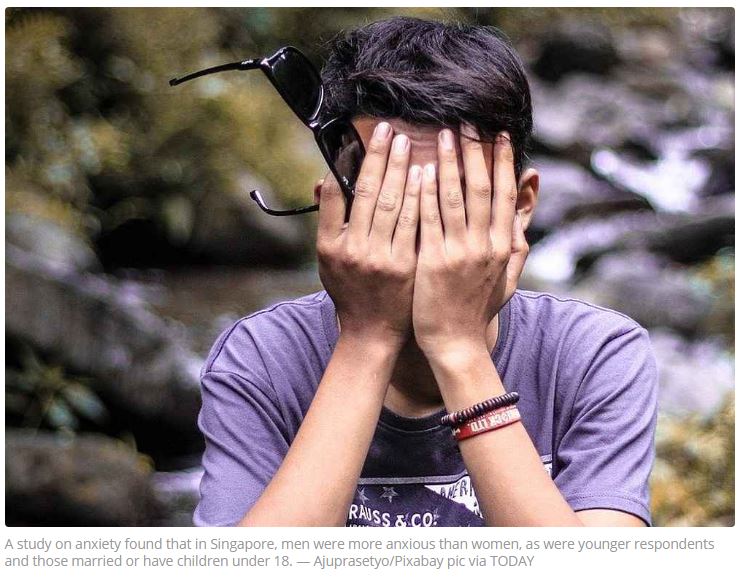Singaporeans most anxious about economic issues and contracting Covid-19 in public spaces, study shows
SINGAPORE, Sept 25 — A study has found that three out of four Singaporeans were feeling anxious over issues such as long-term economic disruption as a result of Covid-19, along with unemployment, possible tax increases and the rising cost of living.
The fear of contracting Covid-19 in public spaces was also a major source of anxiety.
These were findings were released yesterday by communications firm Wunderman Thompson Singapore, which used an anxiety index to measure key stressors faced by people here. The firm interviewed 500 Singaporeans aged 18 and above between June and August.
Overall, it found that 74 per cent of Singapore respondents were anxious, similar levels to those found in studies in New Zealand and Australia, and nearly as high as the 76 per cent in the United States.
While anxiety was high across the board, levels varied according to factors such as age, gender, and number of dependent children.
Singaporeans aged between 35 and 39 were the most anxious, at 80 per cent. The least anxious were those aged between 55 and 59, at 61 per cent.
Men were also more anxious than women, as were younger respondents and those married, or with children under 18.
Singaporeans were more anxious in most areas than respondents to a US survey, though that was conducted in March, just as the coronavirus was gaining wider attention there.
The proportion of Singaporeans worried about various aspects of life:
Economic (78 per cent)
Environment (77 per cent)
Technology (74 per cent)
Health (73 per cent)
Safety and Security (65 per cent)
Singaporeans were significantly less anxious in two areas
Social progress (56 per cent)
Governance (56 per cent)
Economic issues such as cost of living, housing, the possibility of increasing taxes and unemployment, especially among those with children aged 18 to 34, were the biggest stressors.
The study found that Singaporeans were also worried, but slightly less so, about personal circumstances such as job security, food prices or having sufficient funds in their Central Provident Fund (CPF) accounts.
This suggested that government measures to cushion the immediate impact of the pandemic were working, Wunderman Thompson Singapore said.
Biggest concerns
Health remained a big concern among Singaporeans, who were most anxious about the affordability of healthcare and more prevalent illnesses such as diabetes.
This was most evident among youth aged 18 to 34, who also ranked mental health and depression highly.
The study found that long-term environmental anxieties also ranked highly among Singaporeans.
The respondents said that issues such as climate change and associated rising sea levels continue to be a concern. This was especially concerning to millennials aged 25 to 34, but Gen Zs aged between 18 to 24 did not share the same concerns.
In terms of social progress, more were anxious about whether there were too many foreigners at both the high and low ends of the job spectrum.
With jobs at stake, more than half of Singaporeans were worried about the proportion of foreigners in the professional workforce as well as the number of immigrants in the country. This fear was most common among male citizens above 35 and those with children under 18.
In sharp contrast to the other issues, governance was the least of all anxieties, although it was higher among those aged 18 to 34.
Singaporeans said that they were most concerned about the depleting national reserves, which had been drawn upon during the Covid-19 pandemic, followed by the Government’s ability to respond in a crisis.
Long-term expectations
Nearly four in five respondents did not expect Covid-19 to be brought under control until 2021 or later, leading many respondents to rethink how they lead their lives.
Many were reconsidering what they wanted from jobs and work (74 per cent) and the majority wanted to stay in Singapore to be close to family and parents (82 per cent).
Although 83 per cent of respondents said that they have more concerns now than ever before, 60 per cent were also optimistic about the future.
Habits that respondents believe will become the “new normal” also include working from home (65 per cent) and safe distancing norms such as avoiding hugging, kissing or shaking hands (58 per cent).
Malati Afridi, head of experience at Wunderman Thompson Singapore, said that the study showed the “criticality of money”, with economic anxieties dominating over health, safety and social tensions.
She added: “What also emerged was a recalibration of life. People are wanting to stay close to family and rethinking what they want from jobs and how they live their lives.” — TODAY
Source: https://www.malaymail.com/news/singapore/2020/09/25/singaporeans-most-anxious-about-economic-issues-and-contracting-covid-19-in/1906413


 Thailand
Thailand




